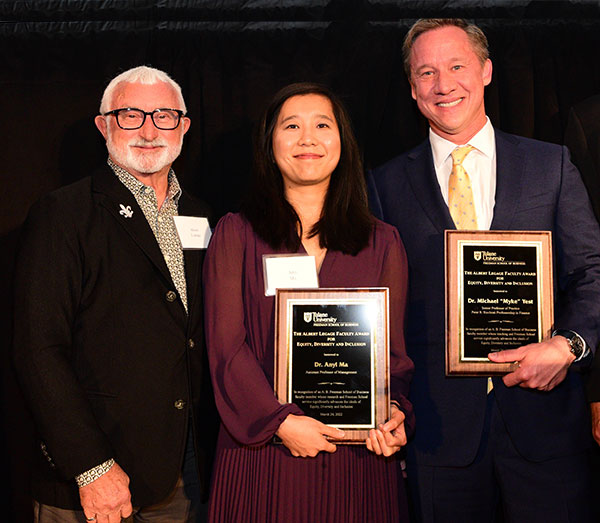
Albert Lepage (MBA ’71), left, with Anyi Ma and Myke Yest, co-recipients of the 2022 Albert Lepage Faculty Award for Equity, Diversity and Inclusion.
Freeman School faculty members Anyi Ma and Myke Yest were named co-recipients of the inaugural Albert Lepage Faculty Award for Equity, Diversity and Inclusion.
Ma, assistant professor of management, received the award for her research related to EDI while Yest, senior professor of practice in finance, was recognized for teaching practices that further the principles of EDI. The $10,000 awards, made possible through a gift of alumnus Albert Lepage (MBA ’71), were announced at the 2022 Lepage Center for Entrepreneurship and Innovation Awards Gala, which took place at the NOPSI Hotel on March 24.
“The principles of equity, diversity and inclusion are more than just an ethical imperative, they’re an essential component of business success,” said Lepage, retired chairman of Lepage Bakeries. “This award recognizes and rewards faculty members who are effectively contributing to our understanding of these important principles through their research and teaching.”
“The world is calling for business to embrace diversity and inclusion as guiding posts for decision making, and if we don’t incorporate that into business school, it’s a disservice to students,” added Paulo Goes, dean of the Freeman School. “We need to foster an environment that promotes diversity, and I think this award creates an incentive for faculty to conduct research and develop classroom materials that support that goal.”
Ma, who joined the Freeman School in 2020, has explored topics including promoting change through developing empathy, the role of white males in bringing about change, stereotypes of female leaders in the workplace, discrimination against Asians, and gender differences in negotiation behavior and outcomes.
“She’s a very active researcher, and her work hits on new and novel topics,” said Adrienne Colella, professor of management and chair of the Strategy for Tomorrow Committee, which reviewed the nominations for the award. “Her work makes a real contribution to the understanding of EDI issues in the workplace.”
“I think there is a very obvious moral dimension to these issues — like the ideas of equality or discrimination — so that’s what moves me on an emotional level,” Ma said. “Hopefully, through my work I can play some role in trying to understand these issues and help build a better world.”
Since 2012, Yest has served as co-director of the JeffreyA. Altman Program in International Studies & Business, a dual-degree program that combines liberal arts and business education with language training, study abroad and a focus on global issues.
“Our Scholars are exposed to anti-racist learning through a variety of coursework and experiences that are woven into their four years of study, both in New Orleans and while studying abroad,” said Yest. “We want our Scholars to be able to reach across lines of difference in their careers and personal life.”
Yest added that he shares credit for developing the program’s EDI initiatives with his Altman colleagues Casey Love, Natalia Daar and Jamie Montelepre.
“What impressed the committee was how cultural sensitivity is woven throughout the program and then monitored and assessed to determine whether students are becoming more culturally aware,” said Colella. “It isn’t just a class about these issues; it’s in everything they do.”
The Strategy for the Future Committee received 13 nominations for the Lepage Faculty Award for EDI, and choosing a single recipient was difficult. In the end, Dean Goes used funds from his Dean’s Discretionary Fund to award the prize to two faculty members rather than choose one or split the $10,000 prize.
“Especially for our inaugural award, I thought it was important to recognize faculty who are furthering the principles of equity, diversity and inclusion in different
but equally valuable ways,” Goes said. “We need to use our research capabilities to help firms understand these issues and improve their efforts, and we need to use our teaching capabilities to help our students succeed in increasingly diverse environments. It’s my hope that this year’s awards will inspire more faculty members to incorporate these very important issues into their research and teaching.”


